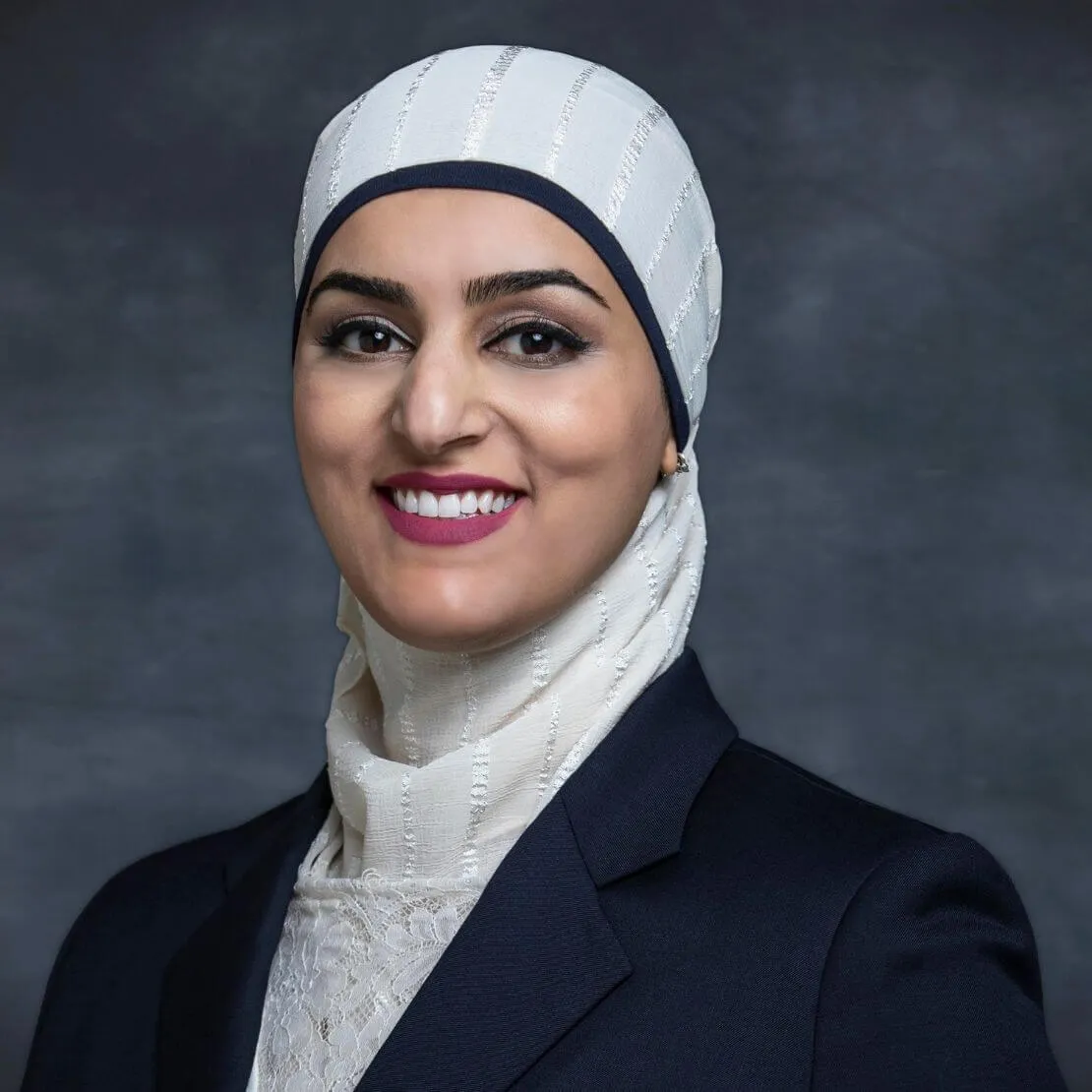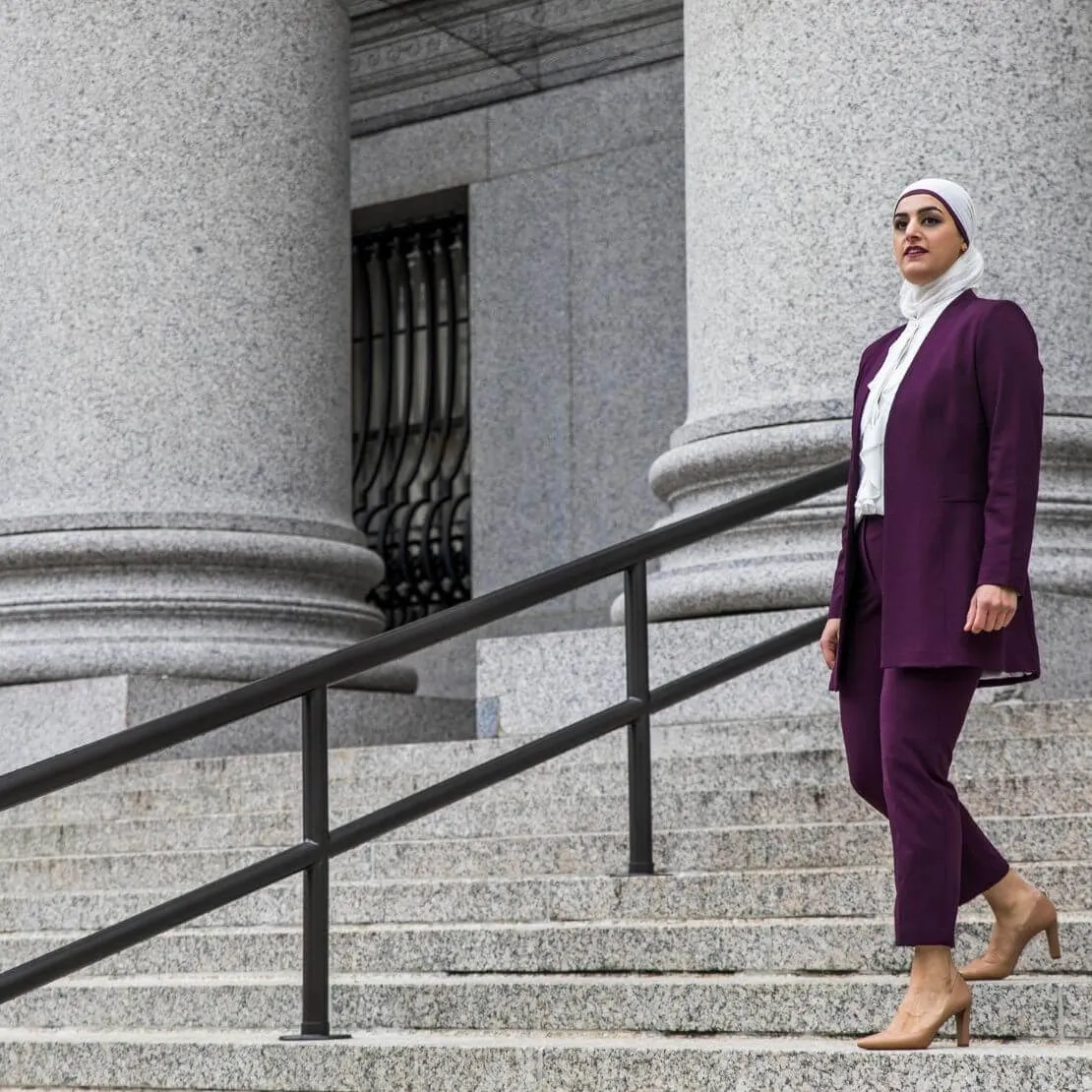“Nothing will make you tougher than being a woman of color in America.”
Earlier in March, Manhattan district attorney Cyrus R. Vance Jr. announced that he would not run for re-election. In 2015, Vance chose not to prosecute Harvey Weinstein. This led to criticism of the DA’s office as a whole, which has only ever had a white male at the helm, as well as a large police budget, harsh sentencing laws, and a history of sending people of color to Rikers. The ensuing race is a fiercely competitive and crowded field with eight Democrats running for an office with the power to reshape the direction of criminal justice reform nationwide. The primary will be held on June 22nd.
Among the eight candidates is Tahanie Aboushi, a Palestinian Muslim woman who, if elected, would be first woman and first person of color to hold the office. “I didn’t think I would end up in politics,” Tahanie told South Asian Today. “I had no choice but to be involved with politics being Palestinian being Muslim, being female… my identity was always a conversation in the news nationally and globally.”
Tahanie is a civil rights attorney, motivated to run by the deeply personal impact the criminal justice system has had on her own life. Her parents and nine siblings immigrated from Palestine and ran a small grocery store in Brooklyn. The family’s life was turned upside down when her parents were tried, and her father convicted of conspiracy charges and convicted to 22 years in prison. “[It was] completely destabilizing for me,” Tahanie said. “It was the first time I had ever walked into a courtroom…. To have everything uprooted and to be thrown into the shadows of society was really drastic. It was when time stopped for me. And in watching [everything] play out, it really intrigued me to understand the power structure. Who is a part of this process, and what happens to families?”

In the wake of George Floyd’s murder last summer and the #BlackLivesMatter protests, there has been a discernible shift in the discourse regarding criminal justice, reflected in this race. Many of the candidates have gone to lengths to position themselves as “progressive prosecutors,” while others, including Tahanie, have highlighted their non-prosecutorial backgrounds as strengths that could revamp the office moving forward. “We’re being told that crime is rising in New York City, but this is the same city where we have not one but five DA’s offices, an over $11 billion budget allocated to the NYPD, and some of the harshest sentencing laws in the country. So we have to ask ourselves, why isn’t this working? Who’s not doing their job?” Tahanie asked. “This system of prosecuting and arresting at all costs is not working. To get in there and do more of it is reckless.”
Tahanie’s lived experience causes her to stand out. “I’m the only candidate that has gotten that 360 view. I have walked in the shoes of those who are affected by the system and that is something that has always been missing in this office and these conversations,” she said. “For me, the difference is having a DA that has walked in the shoes of those impacted by this office, that sees us as human beings… it’s not just about incarceration and prosecution, [and] we need somebody that’s going to think outside that prosecutor box.”
In the spirit of decarceration, Tahanie’s website describes her “declination policy,” listing a series of crimes that her office would refuse to prosecute. “Decarceration means addressing root causes, having alternatives available, and implementing preventative measures,” Tahanie told South Asian Today. Jamarah Hayner, Tahanie’s campaign manager, noted that Tahanie is looking to significantly reduce the office’s budget and reinvest that money in communities.
Jamarah told South Asian Today that she is most excited about Tahanie’s platform for police and prosecutor accountability. “I like that Tahanie really thinks about that systemically -- she looks into that very cozy relationship to hold our office accountable…. I also really like her insistence on co-governance -- it’s not just what the campaign team is thinking about in an ivory tower, it’s working with people who have spent time in prison or come out, to really write these policies together.”
Other contenders in the race include Eliza Orlins (a public defender), Dan Quart (state Assembly Member), Alvin Bragg (former prosecutor and New York Chief Deputy Attorney General), and Tali Farhadian Weinstein (billionaire and counsel to the Brooklyn DA’s office). The Intercept reported that Weinstein is the only candidate who opposes decriminalizing sex work, would not agree to 50 percent budget cuts, nor to defunding the police. “The billionaire candidate in the race, one of the farthest right candidates on the field, is already pumping a lot of money,” Jamarah said. “It's a question of whether someone is going to buy the election, or whether there will be grassroots democracy here.”
Tahanie explained why the stakes of this race are so high for the incarcerated community and their families. “The reason why I jumped in this race is the incarcerated community felt like we were in a zoo - the relationship was transactional with our community…. No one else has my lived experience, and has gone up against the powers that I’ve gone up against despite the apprehensions. When we talk about changing things, really changing things, you need somebody that’s only ever been on the outside…. We’re at that crucial moment - billionaire or civil rights attorney for the people?”
While the pandemic has presented a challenge in connecting with voters in person, the campaign has leaned into virtual organizing via Zoom, social media, and text banking. Jamarah said that the campaign is focused on engaging supporters on a policy level, rather than broad progressive talking points: “[The crowded field] is really bringing some clarity to what it means to have a truly progressive platform…. When it comes down to specific policies and the rubber really hits the road, that’s where we shine.” Jamarah noted that in such a crowded race, individual votes have a huge impact as the margins will be small. Getting people to vote down the ballot requires igniting passion and excitement in the voter base.

Jamarah told South Asian Today that the campaign has a strong voter base including the Black Muslim, Jewish, and AAPI communities. Additionally, Tahanie has secured a number of progressive endorsements including the Working Families Party, Real Justice PAC, Rashida Tlaib, Linda Sarsour, and ASAAL (Alliance of South Asian American Labor). She told South Asian Today about her broader vision that led to the latter labor endorsement: “You have to look at the state of our families, their housing situation and employment situation -- wage theft is a big problem. White collar crime brought this country to its knees with the mortgage crisis. There’s no accountability for crimes like that. We see that in the pandemic - who was bailed out first, and who are we still fighting for?”
Tahanie spoke of legalized, institutionalized discrimination that leads to people being cut out of opportunities for housing and other social services. “Why is a person coming into contact with our office?” She asked. “If it’s a housing issue, that underlying issue is going to have them committed to the same behavior. How can we track that data? Are these people becoming more stable?” Her office plans to analyze and make publicly available such data on social outcomes, as well as on law enforcement interaction with civilians.
Throughout its history, the Manhattan DA’s office has been essentially reactionary, led by white men with track records of harshly prosecuting and sentencing people of color. To some, it may seem like such an office is beyond reform. Jamarah rejected this notion: “If we sit out races like this and let a centrist, conservative candidate get in there - those are individual families. Think about those 1,000, 10,000 families whose lives will be really, really different.” This logic motivated Tahanie to fight Trump’s Muslim ban. “Tahanie camped out there for 4 days,” said Jamarah. “She’s so driven by her values that she just got in the car and went to solve the problem. She has a healthy amount of impatience for things that are structurally broken when actual families are being impacted.”
As a result of her lived experience and family story, Tahanie Aboushi is motivated to lead with a community-centric approach, and has the experience and grit to do it. “As a woman of color from an immigrant family background walking through America, literally nothing has been handed to you,” Jamarah said.”That makes you a tremendous fighter. You have to be twice as good -- something people of color feel all the time in this country. Nothing will make you tougher than being a woman of color in America.” Indeed, Tahanie’s past as a Muslim woman and member of the incarcerated community led her directly to her political present. “During my parent’s trial, they asked, ‘what are you going to do with all these kids?’ The universe has brought that question back to me,” said Tahanie. It’s our opportunity to do the right thing for them.”